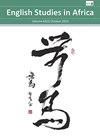Modernisms and Modernities in Achebe’s Things Fall Apart
IF 0.5
4区 文学
0 LITERATURE
引用次数: 0
Abstract
Abstract In this article I argue that Nigerian author Chinua Achebe ostentatiously co-opted Yeats’s poem ‘The Second Coming’ in the title of his 1958 novel Things Fall Apart to mobilize a modernist gesture in order to bookend what is in fact primarily a rehearsal of markers of modernity (realist narration, the structure of the historical novel as defined by Lukács). The latter rehearsal was central to Achebe’s claim for the fully-fledged rationalist character of the Igbo polity and his bid to put his society on a par with European modernity. Crucial to this claim for parity, however, was Achebe’s countervailing manipulation of residual markers of modernism to force a wedge into the monolith of modernity so as to disable those elements of modernity that disqualified African societies from parity with Europe, as against those elements that were desired as offering parity. By the same token, Achebe’s ‘countermodernism’ also foregrounds other versions of history that resonate with global alter-modernisms and thus posits alternative modernities.阿契贝《分崩离析》中的现代主义与现代性
摘要在这篇文章中,我认为尼日利亚作家Chinua Achebe在1958年的小说《分崩离析》的标题中炫耀地选择了叶芝的诗《第二次降临》,以调动一种现代主义姿态,从而结束事实上主要是现代性标记的预演(现实主义叙事,卢卡奇定义的历史小说的结构)。后一次排练是阿切贝对伊博政体成熟的理性主义特征的主张的核心,也是他努力使自己的社会与欧洲现代性并驾齐驱的努力的核心。然而,对这种平等主张至关重要的是,阿切贝对现代主义残余标志物的反制操纵,迫使其楔入现代性的巨石中,从而使那些使非洲社会失去与欧洲平等资格的现代性元素失效,而不是那些被期望提供平等的元素。出于同样的原因,阿切贝的“反现代主义”也预示了与全球变革现代主义产生共鸣的其他历史版本,从而提出了替代现代主义。
本文章由计算机程序翻译,如有差异,请以英文原文为准。
求助全文
约1分钟内获得全文
求助全文

 求助内容:
求助内容: 应助结果提醒方式:
应助结果提醒方式:


